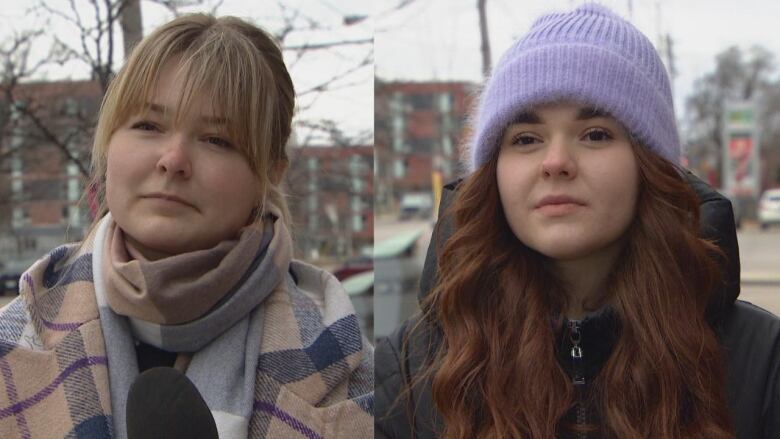Ukrainian international students turn to Ontario colleges, universities for help paying tuition
Average tuition fee for international undergraduate students is $33,623

Oleksandra Sheludko says she wants to hand in her assignments and finish classes on time. But with Russia invading her homeland and cutting off her family's income, she has other urgent matters to consider.
On top of trying to bring her family to Canada, working as a waitress part-time and checking in with her father and grandfather, who stayed behind in Ukraine when the rest of her loved ones fled to Poland, Sheludko says she also needs to scrape together the money to stay in her program.
"I might not be able to finish my study here," said Sheludko, a second -year public relations student at Toronto's Humber College. She said the prospect of having to drop out bothers her "really, really badly."
"It's not an option for me."
At Humber, many international students pay at least $20,000 each year in tuition. According to Statistics Canada, the average fee for the 2021-2022 school year for international undergraduate students is $33,623. That's why Sheludko and many others are turning to their post-secondary schools for support while their families back home grapple with the ongoing invasion and the disruption to their jobs and incomes.
Anastasiia Nastenko says her family fled the Ukrainian capital, Kyiv, to a rural village for safety. With her parents cut off from their normal streams of income, the second-year digital communications student says a discount on tuition at Humber would help keep the pressure off what's left of her family's savings.
"They will never tell me that I need to financially support them — even if they know that I should do that. They will not tell me that because I am their child and they want to support me," said Nastenko, who's now trying to find a part-time job.
Humber finding ways to help
Humber has the highest number of Ukrainian students of all colleges in Ontario, with a total of 183 students — 138 in Canada and 45 in Ukraine learning remotely, says Andrew Ness, the college's dean of international education.
He says the school has been acting quickly to provide academic accommodation and mental health counselling, but also connect with student groups to spread the word on what supports are available.

Sheludko says switching Ukrainian international students to the domestic fee could help cut down their costs drastically. While Ness says this option isn't currently on the table, the school has already eliminated outstanding balances for the winter term.
On Friday, the college released a package of financial supports that includes tuition and housing aid as well as bursaries for living expenses. Humber's student federation has agreed to donate $370,000 to that effort for Ukrainian and Russian students.
"I'm humbled and motivated by the collective spirit and the quality of character that we see," said Ness.
"Our students from Ukraine... have just proven to me that we need to do whatever we can, as an institution, but also as a community, as a province and as a country to try and support these young people."
Schools across the province
Staff at Toronto's Seneca College are in direct contact with each of the approximately 100 Ukrainian students at the school to help them with financial aid, housing, academics and living expenses, says Cory Coletta, Seneca's manager of equity, diversity and inclusion.
"They need empathy and they need understanding," said Coletta.
"As a student, they have a huge amount of competing priorities. And at this time, one of the biggest competing priorities is the violence that's happening in their country, and that needs to be their focus."
Other institutions are helping in similar ways.
The University of Toronto recently launched a $1-million matching fund for donations supporting displaced students from Ukraine, along with emergency grants to Ukrainian students affected by the war.
Schools like Centennial College and George Brown College are also giving emergency funding to Ukrainian students. George Brown made an additional $250,000 available to students affected by conflict in Ukraine, Russia and Eastern Europe.
Nastenko says while she and other Ukrainian students appreciate any support from colleges like Humber, nothing can truly solve the problem they're facing.
"It's hard to admit that your city, your country is destroyed, but with time you kind of get used to that," she said.
"You're trying to live your life, do your assignments, meet with friends ... But at the same time, in your head, you understand that something is wrong."
With files from Sarah Said and Kirthana Sasitharan